
When you think of Orlando what comes to mind? Chances are it’s Disney World. Crowds and the accompanying chaos and cacophony of noise is part and parcel of the Orlando experience. But if you were to head about 30 minutes North, you would likely stumble upon Winter Garden—the antithesis to all things magic kingdom. There, the sidewalks demand a leisurely pace, as passersby meander with ice cream cones and iced lattes—popping into local boutiques to see what’s new. And just down from their local retro movie theatre, with a park bench made for two just outside its door, is Stephanie Robinson’s Apricot Lane.
Apricot Lane is an accessibly priced women’s apparel boutique. And although there is one location in Winter Garden—it is part of a unique franchise that boasts over 115 locations in the United States. On this day, President and CEO of the growing franchise, Chris Lanning meets me to discuss how the parent company, Country Visions Inc, has successfully scaled Apricot Lane across the US since 2017 with their 4 P operational model.
Chris Lanning boasts an incredible retail-centric resume, having worked with giants like Coca Cola and The GAP. With over 30 years of customer facing experience, Lanning is a pro with an arsenal of insights on the art of customer experience. His recent promotion, holding dual leadership positions sees his expertise being applied across all the disciplines of the business.
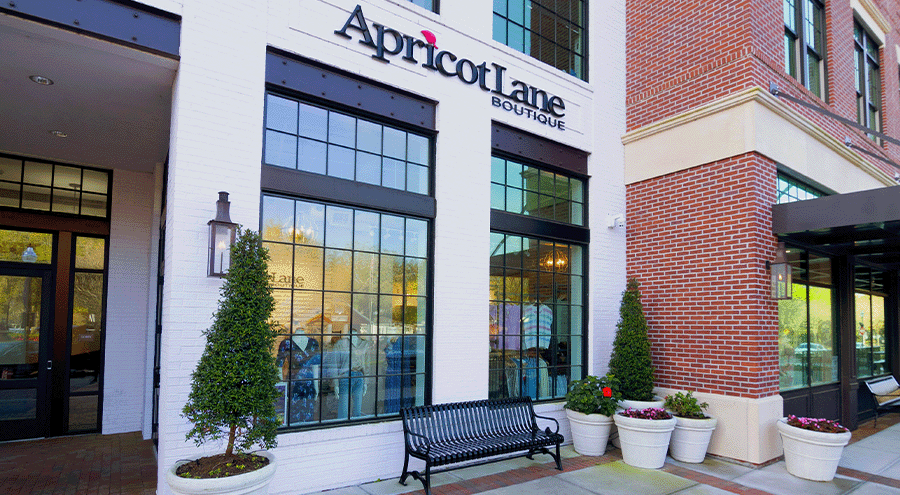
The four ‘P’ operational model
The charm of Apricot Lane is the feeling you’re entering a one-of-one shop. This, of course, is no accident and there are many elements considered so the best of big brand power and personal aspects of a boutique are blended into one seamless experience. Lanning uses a 4 P operational model that creates a framework that all considerations of the business are tied back to. As he defines the approach:
“The four P’s are product, people, and presentation as a way to drive more productivity—and ultimately more sales. This system ensures our franchise owners have the opportunity and the awareness of how to create a unique experience, and one that ultimately drives profitability.”
Product | Curate your offering
The product at each Apricot Lane is curated by location. At the Winter Garden location, walls are lined with a colorful selection of breezy dresses perfect for a stroll on the strip. It takes little imagination to see any of the customers who pop in changing into something off the racks and waking straight out of the store—and this is no accident. Owner Stephanie Robinson pays close attention to what moves off the shelves. Her demographic is an unusual mix of locals, snowbirds and tourists—and for this reason, you might be surprised to hear in Florida at this boutique sweaters sell well almost year round. Owners work hand in hand with vendors.
“One of the strengths and real differentiators about Apricot Lane Boutique is our vendor relationships. We have over 75 vendors that we work with on a regular basis that can help us ensure that we have the right offering in every category, within every boutique. Every boutique is curated uniquely to the customers owners have within their marketplace.”
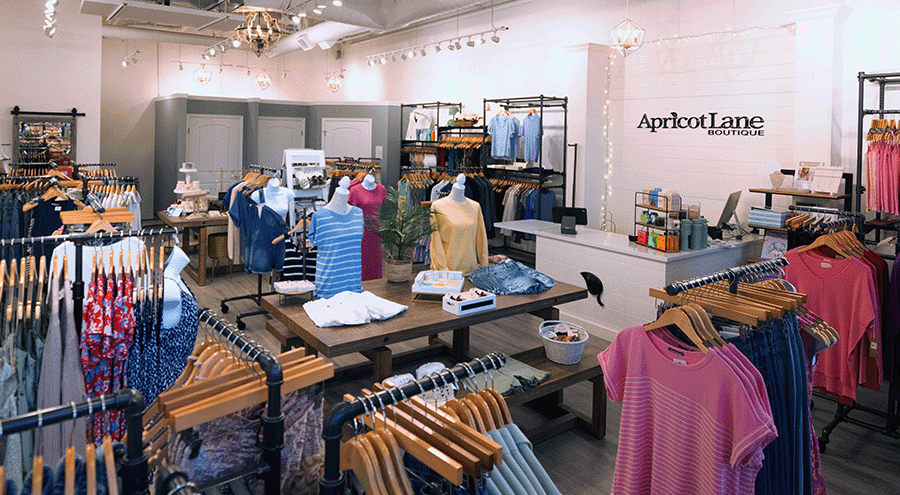
People | Lead with a customer-centric mindset
The role of the owner can’t be minimized in hitting the mark when it comes to product. But there’s more to it than a critical eye and an affinity for fashion. Selecting individuals with true leadership qualities is the backbone of the business. The company (or “corporate” as it’s sometimes referred to by the franchisees) does much to prepare operators for the undertaking of navigating a business—but some qualities can’t be taught.
“The boutique-minded operator is someone that likes to build, create, inform, and to bring alive an experience in a sensory way. And someone that loves to coach and build a team that cares about being engaged in the community. [That type of engagement] delivers the brand in a more relevant way to the consumer, not just through transactions. These are important natural instincts for a successful entrepreneur.”
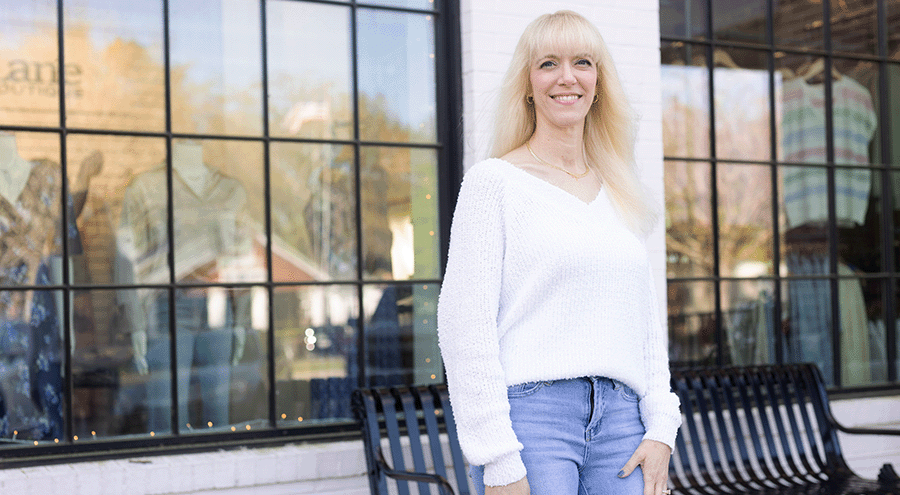
The nurturing of relationships, which is at the core of Apricot Lane’s success, isn’t just between the head office and owners but from the owners to their customers. Franchisees are encouraged to initiate marketing activities that resonate with their local community. For example, Stephanie coordinated a successful Galentine’s Day event at her Winter Garden location. And in the window there was a calendar of up-and-coming events for the month of March. The community element isn’t optics; these details underscore how the store acts as a meeting place and where people congregate—people connect.
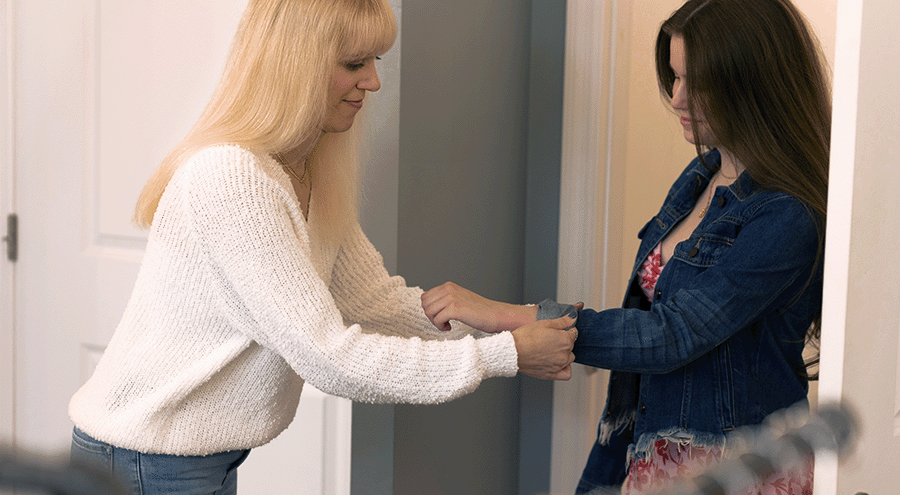
Presentation | Consider your community
Lanning takes a broad view of presentation. It’s not just what happens within the four walls of an individual Apricot Lane—it’s outside in the community, in the marketplace and across the brand social platforms. Showcasing products in a value-add way is built into the brand. What does this mean? It means putting together outfits for the client or presenting trends in a way that makes it feel accessible to the consumer. There’s also consideration for the owners and staff, organizing items in such a way that making recommendations is easy. As Lanning explains, “In-store presentation is about bringing the brand to life from a shopping standpoint.”

At Stephanie Robinson’s location, although every square foot is bursting with new product—the presentation is soothing to take in. Tank tops are arranged in color groupings so your eye can scan across a rainbow of hues to find the perfect one. Display tables are central in the space for shoppers to consider matching accessories that might elevate their look. Half mannequins are strategically placed to highlight key trends of the season and how to layer them with other items. It feels easy and unpretentious, like shopping your girlfriend’s closet and that is intentional. But that energy extends outside of visual merchandising. Chris explains, “The other part of the presentation is outside the boutique. How do you show up in the community? How do you ensure that you’re part of things that matter? The boutique customer makes it really clear that they want to know that you care about more than just the end transaction.”
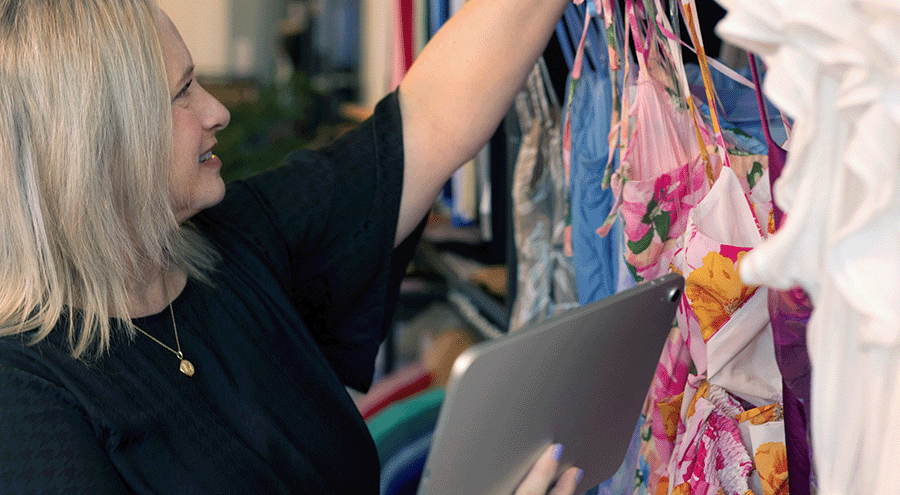
Productivity | Bring it all together
Chris likens the tools and pool of resources at the franchisee’s disposal to a team of players—their bench. But in this case instead of players, it’s a group of seasoned coaches with playbooks across all retail disciplines. The onboarding program is robust at Apricot Lane and there’s quarterly commercial planning as well as monthly meetings made available to operators.
“One of the key tools that we provide our owners is what we refer to as an open to buy. It’s an open to buy process that helps them see inside the productivity, the performance of the product that they have within their boutiques. It’s important to understand the performance of your inventory.”
Lightspeed has played a pivotal role in allowing operators to have up to the moment insights and empowering them to tailor their inventory to their customer’s evolving tastes. Lanning explains,
“The reporting that Lightspeed provides us, [franchisees] are able to see by category what’s working, what’s not working, what’s turning too fast, too slow. And through our business analyst team and partnering with our owners, we can help unlock the potential that exists within their inventory.”

Stay in your Lane
Apricot Lane stands as a strong example of delivering on your promise and not trying to be all things to all people. Lanning notes it’s a specific choice not to sell menswear, kids or even pets for that matter. Their brand interprets trends at an accessible price point for women. Zeroing in on their demographic and providing a consistent experience, one that provides premium elements of the boutique environment, is where they thrive. With an aggressive expansion plan that includes opening between 20 and 30 more locations in the coming years, Apricot Lane’s approach—stepping outside the shopping mall paradigm has provided an open road to growth. For Lanning, the linchpin is the relational component,
“The biggest difference is most big brands are more of a transaction business first. The boutique business is a relationship business first. That sounds simple, but it’s not simplistic—because the boutique minded consumer has a different expectation. It’s not price value, it’s perceived value. And it’s driven by things like they know me by name, they know my birthday. They help me choose pieces and know my favourite brands. We’re giving them a reason to return.”
Read more on how Apricot Lane sets themselves apart
Talk to an expert today if your business needs a point of sale platform that can scale with you.

News you care about. Tips you can use.
Everything your business needs to grow, delivered straight to your inbox.



